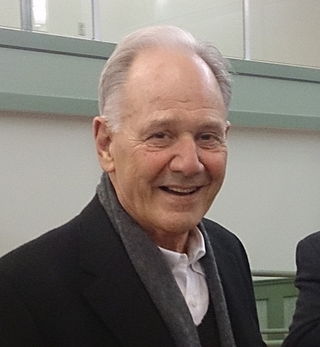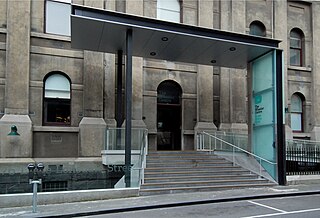Related Research Articles
The Miles Franklin Literary Award is an annual literary prize awarded to "a novel which is of the highest literary merit and presents Australian life in any of its phases". The award was set up according to the will of Miles Franklin (1879–1954), who is best known for writing the Australian classic My Brilliant Career (1901). She bequeathed her estate to fund this award. As of 2016, the award is valued at A$60,000.

Timothy John Winton is an Australian writer. He has written novels, children's books, non-fiction books, and short stories. In 1997, he was named a Living Treasure by the National Trust of Australia, and has won the Miles Franklin Award four times.

The Writers' Trust of Canada is a registered charity which provides financial support to Canadian writers.
The Patrick White Award is an annual literary prize established by Patrick White. White used his 1973 Nobel Prize in Literature award to establish a trust for this prize.

Alexander McPhee Miller is an Australian novelist. Miller is twice winner of the Miles Franklin Award, in 1993 for The Ancestor Game and in 2003 for Journey to the Stone Country. He won the overall award for the Commonwealth Writer's Prize for The Ancestor Game in 1993. He is twice winner of the New South Wales Premier's Literary Awards Christina Stead Prize for Conditions of Faith in 2001 and for Lovesong in 2011. In recognition of his impressive body of work and in particular for his novel Autumn Laing he was awarded the Melbourne Prize for Literature in 2012.
Christos Tsiolkas is an Australian author, playwright, and screenwriter. He is especially known for The Slap, which was both well-received critically and highly successful commercially. Several of his books have been adapted for film and television.
The Christopher Brennan Award is an Australian award given for lifetime achievement in poetry. The award, established in 1973, takes the form of a bronze plaque which is presented to a poet who produces work of "sustained quality and distinction". It was awarded by the Fellowship of Australian Writers and named after the poet Christopher Brennan. The most recent award was made in 2015.
Andrea Goldsmith is an Australian writer and novelist, known for her 2002 novel The Prosperous Thief.
The Australian Literature Society Gold Medal is awarded annually by the Association for the Study of Australian Literature for "an outstanding literary work in the preceding calendar year." From 1928 to 1974 it was awarded by the Australian Literature Society, then from 1983 by the Association for the Study of Australian Literature, when the two organisations were merged.
The New South Wales Premier's Literary Awards, also known as the NSW Premier's Literary Awards, were first awarded in 1979. They are among the richest literary awards in Australia. Notable prizes include the Christina Stead Prize for Fiction, the Kenneth Slessor Prize for Poetry, and the Douglas Stewart Prize for Non-Fiction.
The Age Book of the Year Awards were annual literary awards presented by Melbourne's The Age newspaper. The awards were first presented in 1974. After 1998, they were presented as part of the Melbourne Writers Festival. Initially, two awards were given, one for fiction, the other for non-fiction work, but in 1993, a poetry award in honour of Dinny O'Hearn was added. The criteria were that the works be "of outstanding literary merit and express Australian identity or character," and be published in the year before the award was made. One of the award-winners was chosen as The Age Book of the Year. The awards were discontinued in 2013. In 2021 The Age Book of the Year was revived as a fiction prize, with the winner announced at the Melbourne Writers Festival.
Alison Jean Lester is an Australian author and illustrator who has published over 25 children's picture books and two young adult novels; The Quickstand Pony and The Snow Pony. In 2005 Lester won the Children's Book Council of Australia (CBCA) Picture Book of the Year for her children's book, Are We There Yet?: A Journey around Australia. Her books have been published worldwide.

'The Arts Foundation of New Zealand Te Tumu Toi is a New Zealand arts organisation that supports artistic excellence and facilitates private philanthropy through raising funds for the arts and allocating it to New Zealand artists.
This article presents a list of the historical events and publications of Australian literature during 2008.

The Wheeler Centre, originally Centre of Books, Writing and Ideas, is a literary and publishing centre founded as part of Melbourne's bid to be a Unesco Creative City of Literature, which designation it earned in 2008. It is named after its patrons, Tony and Maureen Wheeler, founders of the Lonely Planet travel guides.
Tony Birch is an Aboriginal Australian author, academic and activist. He regularly appears on ABC local radio and Radio National shows and at writers’ festivals. He was head of the honours programme for creative writing at the University of Melbourne before becoming the first recipient of the Dr Bruce McGuinness Indigenous Research Fellowship at Victoria University in Melbourne in June 2015.
This article presents a list of the historical events and publications of Australian literature during 1959.
Maria Tumarkin is an Australian cultural historian, essayist and novelist., and is as of 2019 senior lecturer in the School of Culture and Communication at the University of Melbourne, teaching creative writing.
Maxine Beneba Clarke is an Australian writer of Afro-Caribbean descent, whose work includes fiction, non-fiction and poetry. She is the author of over 14 books for children and adults.
This article presents a list of the historical events and publications of Australian literature during 1980.
References
- ↑ "Melbourne Prize Trust". Melbourne Prize Trust. Retrieved 23 October 2013.
- 1 2 3 4 5 6 7 "Literature". Melbourne Prize Trust. Retrieved 11 November 2023.
- ↑ "Finalists announced for the Melbourne Prize for Literature and Awards 2015". Readings Books. 1 September 2015. Retrieved 11 November 2023.
- 1 2 3 4 5 "The 2021 winners of the Melbourne Prize for Literature & Awards". Readings Books. 10 November 2021. Retrieved 11 November 2023.
- 1 2 "Austlit — Melbourne Prize". Austlit . Retrieved 9 November 2023.
- ↑ "A very Melbourne man collects literary prize in "The Age"". The Age. 12 November 2009. Retrieved 23 October 2013.
- 1 2 3 Steger, Jason (11 November 2015). "Poet Chris Wallace-Crabbe wins the Melbourne Prize for Literature" . The Age . Retrieved 11 November 2023.
- ↑ Steger, Jason (14 November 2018). "Alison Lester wins the $60,000 Melbourne Prize for Literature". The Sydney Morning Herald. Retrieved 14 November 2018.
- ↑ Burke, Kelly (10 November 2021). "Christos Tsiolkas wins $60,000 Melbourne prize for literature". The Guardian. Retrieved 12 November 2021.
- 1 2 "Drummer taps into rhythm of tranquillity". The Age . 8 May 2011. Retrieved 11 November 2023.
- 1 2 3 "Melbourne Prize for Music 2022". Melbourne Prize. 23 May 2022. Retrieved 11 November 2023.
- ↑ "Melbourne Prize for Music". Australian Music Centre . Retrieved 11 November 2023.
- ↑ "David Jones". Drumtek Store. 11 November 2023. Retrieved 11 November 2023.
- ↑ Wright, Simon. "David Jones". Move Records. Retrieved 11 November 2023.
- ↑ "Finalists come together to share $60,000 Melbourne Prize for Sculpture 2020" (PDF). 11 November 2020. Retrieved 5 April 2021.